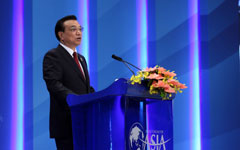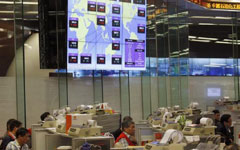Regulation of listed companies and securities firms will be based on the location they go public and gain business licenses under a pilot program of cross-market stock investment by Chinese mainland and Hong Kong investors, the China Securities Regulatory Commission said on Friday.
When security firms help in cross-border investments, the outbound regulators can also regulate the trade, said the commission.
"Regulators at the locations where investors undertake trading will protect their interests," said Zhang Xiaojun, a commission spokesman.
 |
|
 |
The program allows a maximum cross-border investment of 550 billion yuan ($90 billion). Investors in Shanghai and Hong Kong will be able to buy and sell up to 23.5 billion yuan of stocks in certain companies each day on each other's exchanges.
Zhang said the China Securities Regulatory Commission and the Securities and Futures Commission of Hong Kong are signing supplementary agreements to deal with illegal activity and perfecting the mechanism of information-sharing based on previous memorandums of cooperation.
The CSRC will develop supporting rules for trading methods, arrangements for the timing of trades, information disclosure and an emergency disposal scheme.
"Although the pilot program and the programs for QFII, RQFII, and QDII play the same role in diversifying the methods of cross-border investment, they are different in many aspects," said Zhang. QFII, RQFII and QDII stand for Qualified Foreign Institutional Investors, RMB Qualified Foreign Institutional Investors and Qualified Domestic Institutional Investors respectively.
Zhang said the Shanghai and Hong Kong stock exchanges will be the vehicles for the pilot program, because trading orders are made through the connectivity of the two bourses.
Asset management companies issue financial products to investors and raise funds to undertake investments, so they are the vehicles for the programs of QFII, RQFII and QDII.
